CollegeVine is an online college admissions platform offering mentoring and admissions tools. It provides services like admissions advising, essay review, test prep, and a college-chance calculator. In this article, we compare CollegeVine with competitors to help students and parents make an informed choice when looking for tutoring or admissions help.
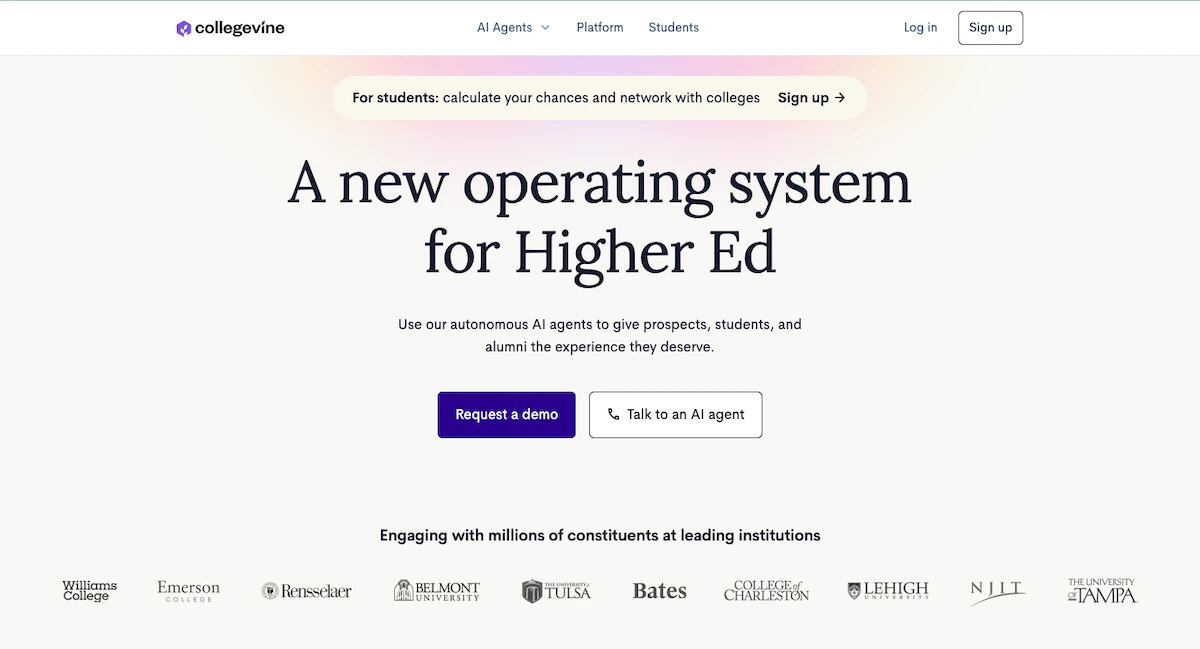
CollegeVine Reviews and Testimonials
Trustpilot (63 reviews, 3.8/5)
On Trustpilot, CollegeVine has a 3.8-star average from 63 reviews. Many 4-5 star reviews praise its college chancing tool and supportive advisors. For example, one user says it made admissions “less of a guessing game”. However, there are 1-star reviews criticizing its service: students report missed deadlines and refusing refunds. One parent said a two-week cancellation lost them $800 due to a “ridiculous refund policy”. Common complaints include slow turnaround and unhelpful guidance. Overall, Trustpilot feedback is mixed: positive about the free tools and guidance but negative about refunds and tutor quality.
Boldorg (1076 reviews, 4.5/5)
Bold.org aggregates student testimonials and rates CollegeVine highly (4.5 out of 5) with 1076 reviews. Users praise CollegeVine’s admissions tools: the college list and scholarship search are called “invaluable” and comforting. Many students highlight the “helpful” and “supportive” nature of its mentors. Positive themes include reliable college guidance and insightful statistics. Negative themes on this site are rare, reflecting mostly strong satisfaction. This contrasts with more critical reviews on Trustpilot.
CollegeVine Website
The CollegeVine site itself features student testimonials praising its free tools and mentoring. Visitors often note that the chance calculator and community answers ease anxiety about applications. The company highlights success stories (high acceptance rates and scholarship wins) on its pages. These official testimonials stress helpful advice and easy-to-use features, but they naturally omit complaints. In sum, the company’s site shows happy users valuing its personalized admissions help.
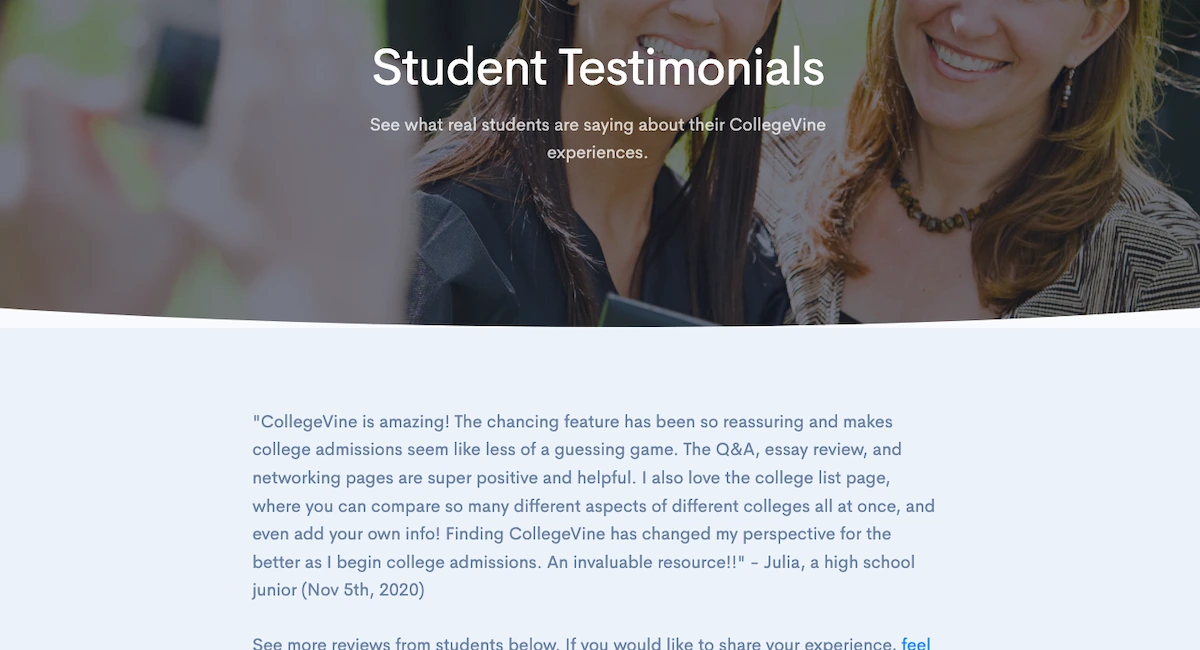
Is CollegeVine legit? Based on available reviews, CollegeVine is a real company with many users, but experiences vary. Trustpilot and forums show real students using it; many get useful guidance and college stats. However,[pl multiple independent reviews warn that CollegeVine can under-deliver and has strict refund rules. Some calls it a “scam” when advice fails or refunds are refused. In summary, CollegeVine is genuine but treat it cautiously: its free tools are helpful, but paid mentoring has mixed feedback.
CollegeVine Pricing
Pricing Range
CollegeVine’s pricing is mostly in USD. Its comprehensive admissions programs run around $1,300 on average – about one-third the cost of traditional counselors. For example, expert college essay reviews cost about $60 per essay. There are no hourly tutor listings; instead, students pay per service or package. Basic features like college admission chances and Q&A forums are free. (Visit CollegeVine’s site for the latest pricing details.)
What students say about CollegeVine Pricing
Some users feel CollegeVine’s paid services are expensive. For instance, one student noted an expert essay review is about $60 and questioned its value. On forums, students compare this to industry norms (e.g. Chegg subscriptions are ~$15–$20/month). Some say the price is reasonable given mentors’ credentials, while others find it steep for limited service. Overall, reviewers often say CollegeVine’s costs are higher than free resources but in line with private consultancy rates.
Hidden costs
There are no clear sign-up or cancellation fees listed for CollegeVine. It does not charge a registration fee for basic use. Additional services like resume reviews or extra consultations cost extra. Some users have complained on Trustpilot that they were charged unexpectedly for services (like late cancellations). However, the site itself has no published “hidden fee” policies. In practice, aside from paying up front for booked services, no major hidden costs are evident.
How CollegeVine’s pricing works
CollegeVine accepts credit card or PayPal for all payments. Students typically pay in advance when booking a service. There is no monthly subscription; each tutoring or consulting session is paid per use. Some mentors have flat session rates, while packages (like a multi-session admissions program) have a set total price. CollegeVine occasionally offers bundle deals (e.g. essay + application review). It does not advertise special discounts (like for veterans or low-income) or group rates.
Free Trial
CollegeVine does not offer a traditional free trial for paid services. Instead, it provides some free tools and community support. For example, they still have a free “peer essay review” option, where community members can critique an essay at no cost. But for expert reviews or admissions advising, you must pay from the start. No time-limited trial of the paid mentorship exists.
Refund policy
CollegeVine’s official refund policy is not clearly published. In practice, users report a very strict policy. One Trustpilot reviewer said they received no refund after canceling and lost hundreds of dollars. On Reddit, students mention a “24-hour” refund window: if that passes, no money is returned. These accounts suggest CollegeVine does not make refunds easy. No company guarantee is noted on their site, and support emails regarding refunds often go unanswered. As a result, many feel refunds are effectively unavailable.
CollegeVine Alternatives
Students might look for CollegeVine alternatives if they want different subjects, pricing, or tutor quality. Alternatives often specialize differently – some focus on homework help (not admissions) or have larger question databases. Below are several popular platforms that serve similar needs.
In summary, options range from broad homework help (like Chegg) to specialized tutoring (MEB). Each has its own mix of pricing and features, which can match different student needs.
Chegg
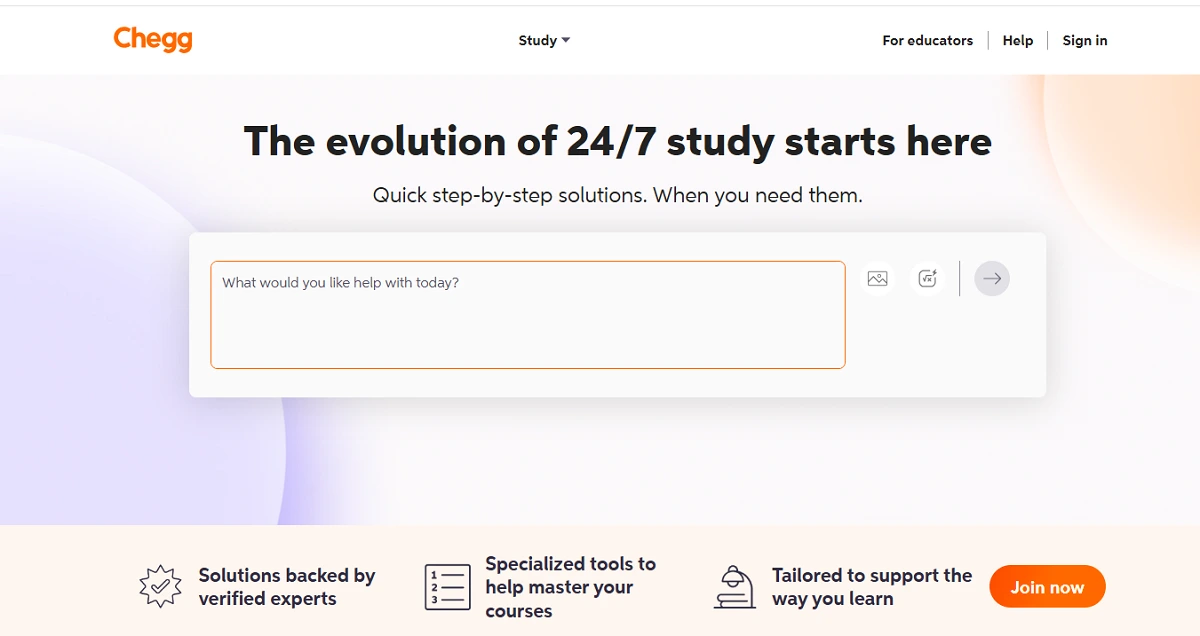
Chegg is a popular tutoring and study platform offering on-demand Q&A and textbook solutions. Pros: Chegg covers many STEM subjects and offers 24/7 help and study resources with a monthly subscription (about $15–$20) for unlimited questions. It also has a large library of solved problems. Cons: Chegg does not provide personalized college admissions advice, and answers are sometimes incorrect. It requires subscription for full access and has no live essay review like CollegeVine. Overall, Chegg is great for quick homework help, but it isn’t tailored to college application mentoring.
Wyzant
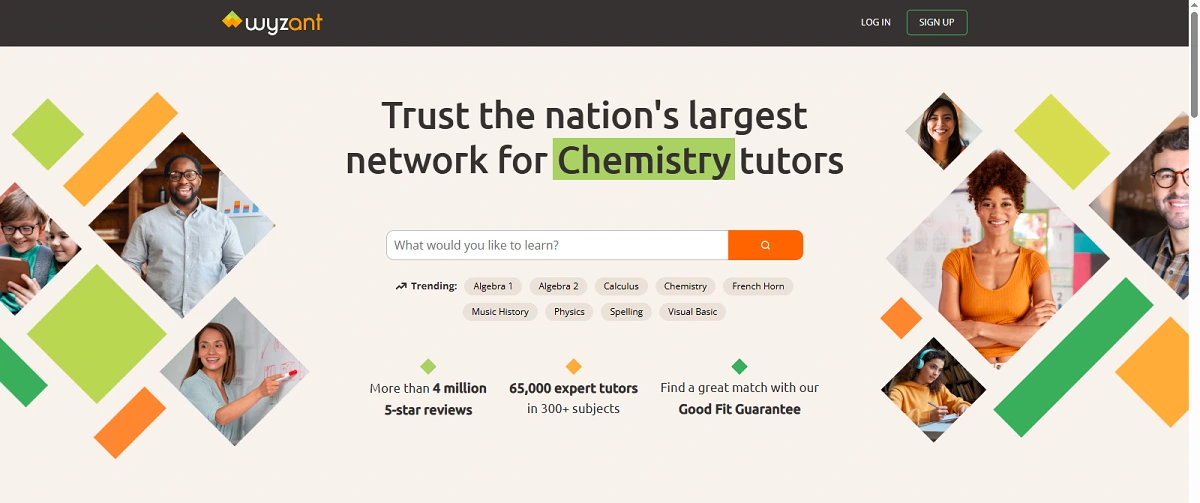
Wyzant is a tutor marketplace for many subjects. Pros: It offers one-on-one tutoring for math, science, test prep and more. You choose a tutor and pay by the hour (often $30–$100+), with the first lesson free. It covers a broad range of grades. Cons: Wyzant is generally more expensive than CollegeVine and takes a big commission, so low-priced tutors may be less experienced. Many reviews complain about hidden charges and poor support. Wyzant has no admissions tools. Students use it mainly for academic subjects rather than college planning.
Course Hero
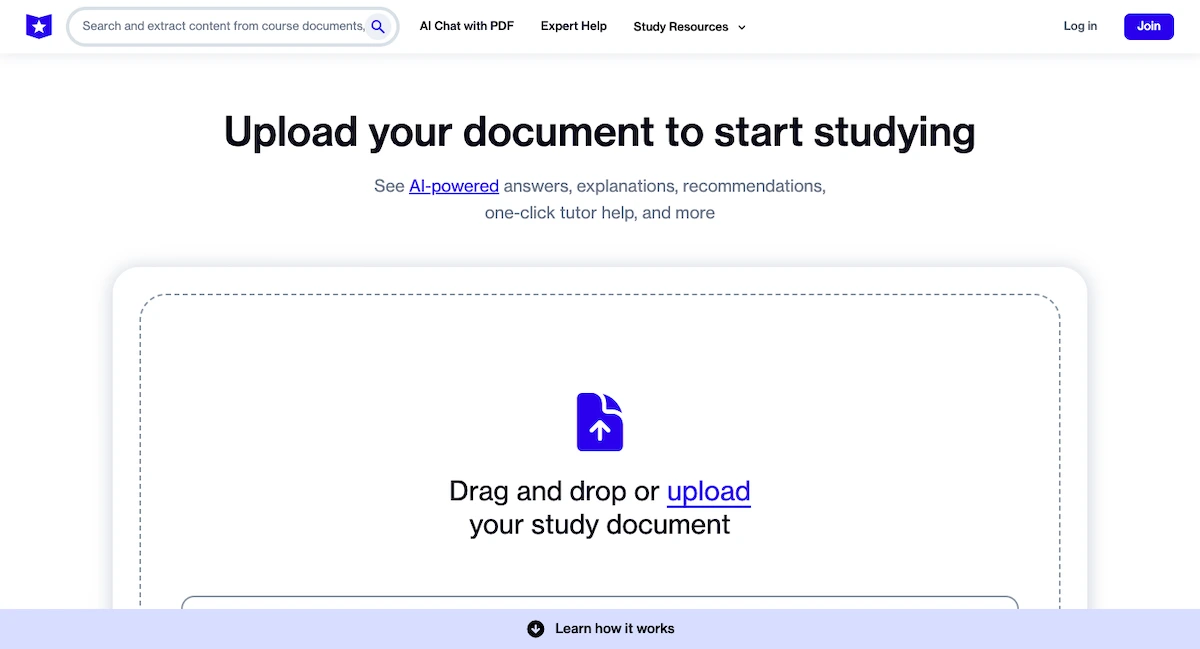
Course Hero is a subscription site with a vast library of study materials and Q&A help. Pros: It offers notes, textbook solutions and answers in many subjects. Subscriptions start around $10–$40 per month, which can be cost-effective for frequent users. Cons: There is no live tutoring or personalized feedback. Quality can vary because content is user-contributed. It also lacks college advising tools. Course Hero is best for quick study help and reference material, not for mentoring or essay review.
MyEngineeringBuddy
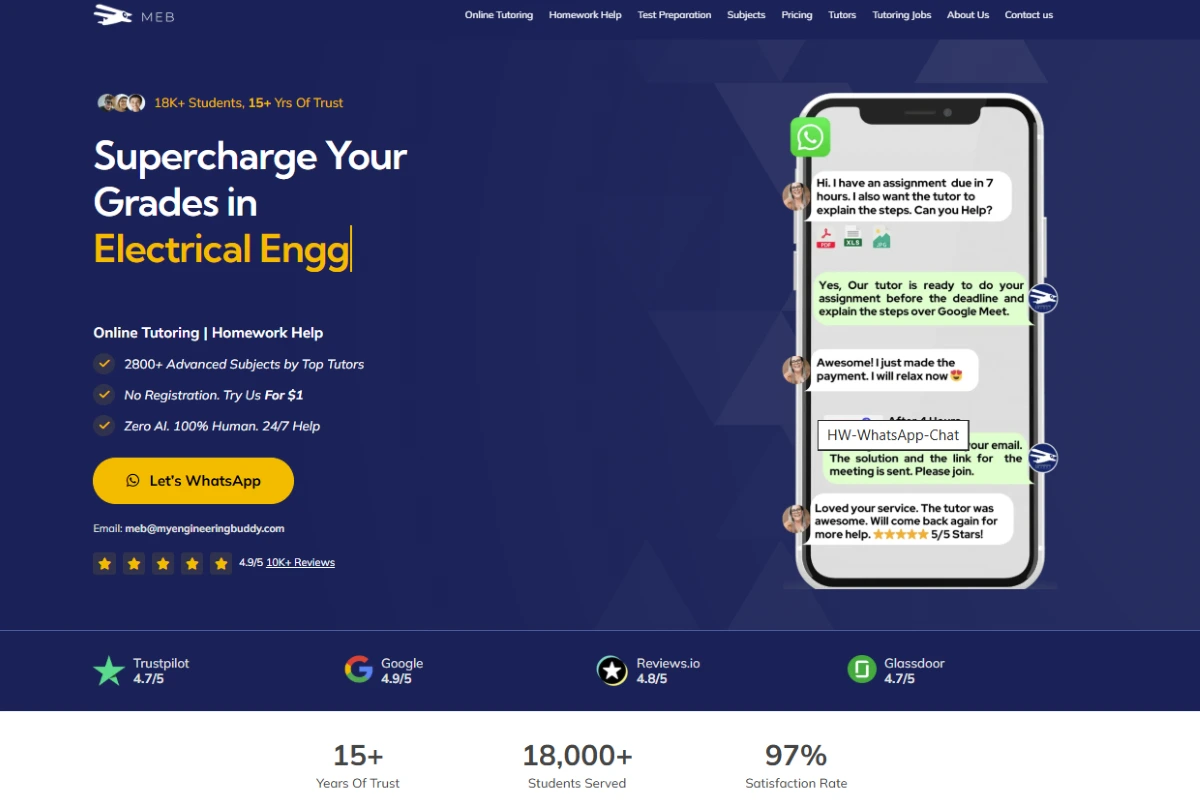
My Engineering Buddy is an online STEM tutoring service. Pros: It focuses on advanced math, engineering, physics, and technology subjects. Tutors are experts in these fields, and users praise its detailed, easy-to-understand help. Pricing is hourly and often lower for students, with no subscription required. It provides 24/7 chat support and transparent policies. Cons: It does not specialize in college admissions or essay advising. Students seeking test prep or college planning may find its offerings limited. Overall, CollegeVine works on admissions; MEB is stronger for technical homework and complex subjects.
Tutor.com

Tutor.com (part of Princeton Review) offers live online tutoring for school and test prep. Pros: It has experienced tutors and covers many subjects up to college level, plus SAT/ACT prep. It offers monthly plans or pay-as-you-go. Its tutors are vetted. Cons: It requires subscription fees (often >$100) or per-session charges. It provides no free resources or admissions advice. Like Chegg, it is academic-focused rather than admissions-focused. Users might prefer Tutor.com for general courses but not for college applications.
How it Works?
For Students
Students start by signing up for a free CollegeVine account on the website or app. They enter their academic details (GPA, test scores, interests) to build a profile. For college admissions help, students can then use free tools like the chance calculator or Q&A. To get 1:1 help, a student selects a service (essay review or full counseling program) and pays as required. CollegeVine then matches the student with a mentor or consultant based on their profile. Sessions are scheduled via email or the site’s calendar. All tutoring happens online through video or chat, and students can communicate with their advisors through the platform.
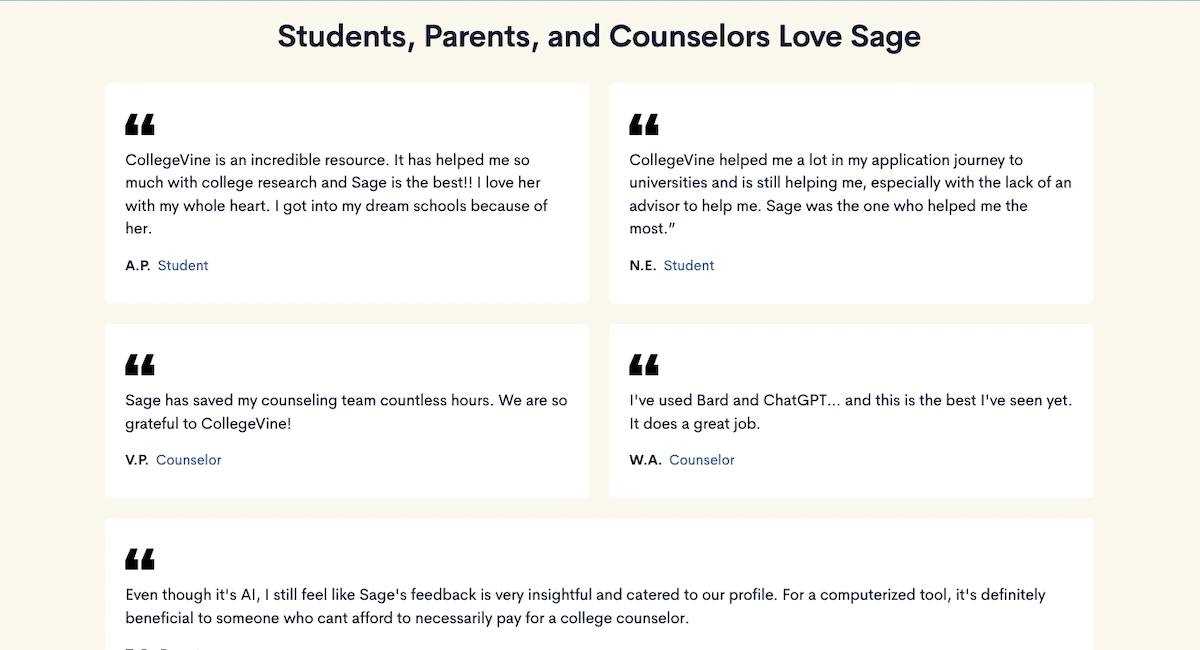
For Tutors
Tutors (called consultants) on CollegeVine are typically current college students or alumni. To apply, interested tutors fill out an online application or “Future Teammate” form on CollegeVine’s site. The company reviews the candidate’s profile and academic background. Shortlisted applicants go through an interview and training process, focusing on college admissions expertise. Once accepted, tutors set up their CollegeVine profile (detailing majors, credentials, and experience). They then get matched with students seeking help. CollegeVine pays tutors a fixed rate per session. Tutors do not set their own fees; pay is determined by CollegeVine. CollegeVine provides guidance and a help center, but tutors largely work remotely on their own schedule. See CollegeVine’s careers page for current tutor openings and how to get started.
FAQs About CollegeVine
How does CollegeVine compare to My Engineering Buddy? CollegeVine focuses on college admissions and essay guidance, while My Engineering Buddy specializes in STEM tutoring and homework help. CollegeVine provides admission planning tools and mentoring, whereas MEB offers one-on-one help in advanced subjects. Unlike CollegeVine’s mixed user reviews and strict refund policy, MEB emphasizes responsive support and clear pricing. In short, CollegeVine is admissions-oriented and MEB is STEM-oriented.
Is CollegeVine free to use or does it cost money? Many basic CollegeVine tools (like college chancing calculators, scholarship search, and community Q&A) are free. Paid services cost extra: for example, expert essay reviews run about $60 each, and full advising packages cost in the low thousands. There is no subscription fee for the free features – you only pay for the premium services you choose.
Who is CollegeVine meant for? CollegeVine is designed mainly for U.S. high school students applying to college (and their parents). It is especially used by students aiming for four-year universities and selective schools. International students can join, but most tools target the U.S. admissions process. It is not intended for younger K-12 tutoring; rather, it serves high school juniors and seniors navigating college applications.
What services does CollegeVine offer? CollegeVine offers college admissions mentoring and related services. Students can get help with application strategy, essay editing, resume building, and test prep advice. It also provides a chance-of-admission calculator, school-list generator, and scholarship finder. There is an online Q&A forum where students can ask admissions questions. CollegeVine does not offer general homework tutoring in math or science; its focus is on the college application process.
Can CollegeVine guarantee college admission? No. CollegeVine can guide and advise, but it cannot promise admission to any school. The company advertises high acceptance statistics (for example, 78% Ivy acceptance in past data), but these are not guarantees. Actual admission depends on each student’s profile and college decisions. CollegeVine improves a student’s chances by optimizing their application, but there is no performance guarantee.
How do I start using CollegeVine? To start with CollegeVine, sign up on their website and create a student account. You can immediately use free tools and explore resources. If you need paid services, browse the available programs (such as essay review) and pay the fee. CollegeVine then assigns an advisor or mentor. The process is all online, so you simply log in, fill in your profile, and begin interacting with your mentor or the CollegeVine platform to schedule sessions.
Company Information
Founding Year and Background: CollegeVine was founded around 2013 by college students; the business was incorporated (as Canopy Education, Inc.) in January 2016. It began as a near-peer mentoring network (“Admissions Hero”) to give students affordable guidance. Co-founders include Harvard students Johan Zhang and Zack Perkins, and Vinay Bhaskara. Zhang started gathering students after 2013, and by 2015 the company had achieved strong client growth and raised venture funding.
Founders: The three co-founders are Johan Zhang, Zack Perkins, and Vinay Bhaskara. They started CollegeVine while at elite universities (Harvard and UChicago) and aimed to democratize college admissions counseling. Zack (“Zachary”) Perkins serves as CEO, and Zhang is also a prominent leader.
Mission and Vision: CollegeVine’s stated mission is “to make higher education more accessible,” particularly through data and technology. In practice, that means helping students navigate admissions and scholarships. The company’s vision emphasizes leveling the playing field for college applicants, regardless of background. It aims to use AI and mentoring so that all students have advice that formerly only came from private counselors.
Scale of Operation: Headquartered in Cambridge, Massachusetts, CollegeVine operates globally. Its platform has been adopted by universities and high schools, and the company reports engaging over 2.3 million students worldwide through partnerships. CollegeVine works with dozens of partner institutions. It started with a few dozen college-age mentors the exact current number is not public, but earlier reports listed 300 undergraduate consultants. The official BBB profile lists only 4 employees, reflecting a lean corporate team behind the tech platform.
Types of Services: CollegeVine provides college planning and admissions consulting. Services include 1:1 mentorship on essay writing and applications, test preparation advice, scholarship search tools, and an interactive Q&A forum for student questions. In 2024 they expanded to include AI-powered recruiting products for universities, but their core student-facing services remain college admissions guidance and application support.
Subjects Offered: The platform focuses on college-admissions subjects. Students can get help with English writing (essays), math and science for SAT/ACT prep, and advising on majors like engineering or business. While the mentors often have strong STEM backgrounds, the emphasis is on college credentials and essays. Subjects like calculus, physics, chemistry, economics, and writing are common in sessions. General K-12 homework in non-college topics is not part of CollegeVine’s offerings.
Unique Features: CollegeVine offers several standout features. It has a free college admissions “chances” calculator and scholarship finder, which many companies do not. It advertises that all mentors are near-peer college students (many from top universities) to keep costs low. Recently, it has built AI-driven tools (like an AI admissions recruiter) for higher education institutions. The platform also emphasizes merit-based, mission-driven programs (like pro-bono counseling for disadvantaged students). Based on online reviews, these promises partly hold: the free tools are indeed praised, but paid services sometimes fail to meet high expectations.
USP of CollegeVine
- Free college planning tools – CollegeVine offers a no-cost admissions chance calculator, school list generator, and peer Q&A forum, which users find very useful.
- High-achieving student mentors – All tutors are recent or current college students (many from top schools), allowing CollegeVine to charge lower fees than traditional consultants.
- Admissions success metrics – The site highlights strong results (e.g. high Ivy acceptance rates and scholarship averages) to build trust.
- AI-enhanced platform – CollegeVine has integrated AI agents into its services for colleges (new in 2024), positioning itself at the cutting-edge of edu-tech.
Drawbacks of CollegeVine
- Variable tutor quality – Despite the Ivy-mentor pitch, many students report getting average counselors with little professional training.
- Pricing vs. service – Some users feel the paid services are overpriced and underdeliver; negative reviews mention missed deadlines and poor guidance.
- No refund guarantee – The company has a strict cancellation policy, and multiple reviews call the refund terms “ridiculous”.
- Limited to admissions help – CollegeVine does not cover everyday homework subjects or provide tutors for non-college content, so it’s not a general tutoring solution.
- Poor customer follow-up – Trustpilot notes indicate CollegeVine often ignores complaints (many users say “hasn’t replied to negative reviews”), suggesting weak support.
Comparison with My Engineering Buddy
My Engineering Buddy (MEB) focuses on engineering and STEM tutoring, whereas CollegeVine focuses on college admissions. MEB users praise its experts for making tough problems simple (“Physics homework has been amazing… His explanations were extremely easy to grasp”). In contrast, CollegeVine clients often struggle with inconsistent advising. Unlike CollegeVine’s mostly admissions-oriented service, MEB specializes in detailed homework help and offers flexible 1:1 sessions. Many students prefer MEB for complex subjects, since its tutors tend to be subject-matter experts with prompt, personalized attention.
Customer Support and Policies
CollegeVine provides email support via a PR agency (LaunchSquad) and a help center. However, user feedback suggests slow or inadequate responses – for example, reviewers say complaints go unanswered. The refund policy is vague and not consumer-friendly (as noted earlier). In general support responsiveness is viewed as poor. By comparison, My Engineering Buddy offers live chat and 24/7 support (according to its site) and is known for actively helping students, giving MEB an edge in customer service.
Global Reach and Localization
CollegeVine is primarily U.S.-focused, centering on American college admissions. Originally all services were in English and U.S.-centric. Recently, they’ve added AI agents that support 30+ languages, which can help non-English speakers. The company now works with schools in over 20 countries and has millions of students globally. My Engineering Buddy also serves international students (US, UK, Gulf, etc.), but CollegeVine’s free tools and partnerships (like one with General Assembly for 2.3M students) show its growing global footprint.
CollegeVine’s Future Plans
CollegeVine is heavily investing in AI. In late 2024 it expanded its platform with autonomous AI agents for college recruitment and advising. The company is developing products like an AI Recruiter and AI Advisor to automate student outreach. It also plans partnerships to broaden access (e.g. its 2023 tie-up with General Assembly to reach 2.3 million students). Beyond AI, CollegeVine aims to add more data-driven tools for student success and diversify its revenue sources. Overall, future plans involve leveraging technology to scale admissions counseling and improve access, while forming new institutional partnerships.
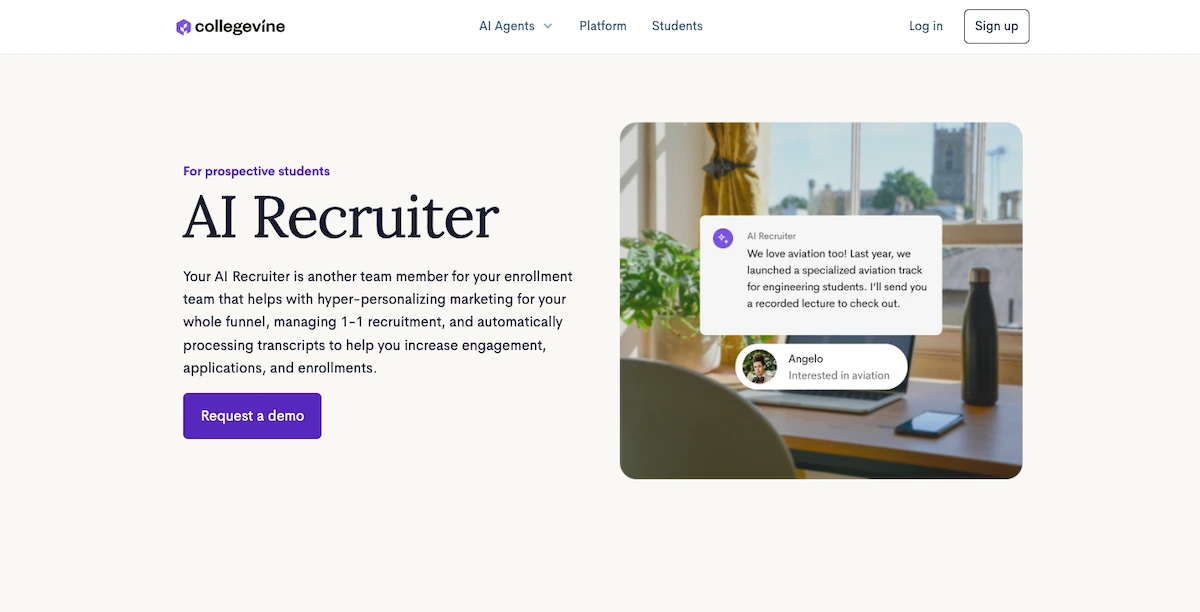
Conclusion
CollegeVine offers useful admissions tools and a large network of student mentors, but its paid services have drawn criticism for variable quality and strict refund rules. Its strengths lie in free planning features and extensive admissions data. For students needing advanced STEM tutoring or guaranteed support, My Engineering Buddy is often a better choice. MEB’s expert tutors and responsive help for tough subjects make it a strong alternative when CollegeVine’s admissions focus isn’t the right fit.
******************************
This article provides general educational guidance only. It is NOT official exam policy, professional academic advice, or guaranteed results. Always verify information with your school, official exam boards (College Board, Cambridge, IB), or qualified professionals before making decisions. Read Full Policies & Disclaimer , Contact Us To Report An Error

